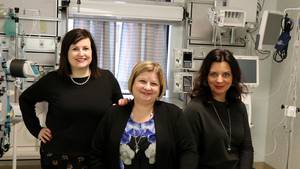One of the most rewarding aspects of being in the rehabilitation profession is the ability to truly connect with those you’re helping. And often this connection has a much deeper impact than imagined.
For physiotherapy student Kyle Crosby, his six-week placement at the QEII Health Sciences Centre exposed him to all the good a hospital community truly offers.
Studying for his Masters in Physiotherapy at Dalhousie University after completing his undergraduate degree in Kinesiology, Kyle first realized he was destined to help others in his third year. It was when his brother severely broke his leg, and Kyle was there to help him rehabilitate and recover.
His placement was split between the QEII’s neurosurgery unit and the Nova Scotia Rehabilitation Centre, where he was in the rare position of being able to work with some of the same patients his entire placement.
“For our placement, one half of my class was at the Halifax Infirmary site, and the other half was at the rehab centre, so we had some people who came in on day one to the Halifax Infirmary, and were moved to rehab when we were still on our placement,” says Kyle. “To see their transition from acute care to long-term rehabilitation was a touching experience.”
Kyle, 25, had some preconceived ideas for what his experience would be like; he learned quite quickly that those ideas would be taken to a whole new level.
“It’s amazing – you learn about all these things in school, but you don’t truly get to see it or do it until you’re put in your placement,” says Kyle. “Like when you see someone who has survived a stroke for the first time, and you see how they and their family is affected...it’s truly an awe-inspiring moment.
“In school you’re practicing with your classmates, but in reality the injuries are far more debilitating than you could ever imagine.”
Kyle is one of many residents that learn at the QEII each day, the only adult teaching health centre in the Maritimes. His clinical instructor, Anna Smallwood, says the number of students around is actually quite beneficial.
“One of the great things is that a lot of students come to the QEII at the same time, so they’re able to all learn with each other,” says Anna. “For example, every Tuesday there would be sessions where all the students could get together, and learn clinical skills specific to that discipline. Other health centres across the country wouldn’t necessarily have that option, as there needs to be a large influx of students to support that.”
Anna, a physiotherapist whose background is acute neurosurgery, also notes physicians and staff at the QEII are all very specialized in their areas. This means the students are not so much learning from a jack-of-all-trades, but from someone who is well-versed in the specific discipline they have chosen in their profession.
The staff, as a result of working with students so frequently, is also very comfortable helping teach these future medical professionals.
“On my floor in particular, everyone in the different professions seemed to take students under their wing to make sure they had a multi-disciplinary experience, and that they became part of the team,” says Anna. “And this is important to boosting the confidence and experience of the students.”
The enthusiasm of the staff at the QEII was equally noticed by Kyle and the other students.
“The surgeons were asking us questions –such as what can we do to help certain patients – and we were referred to on a first-name basis by everyone,” says Kyle.
“Being a team was what we always talked about in school, but this group was very much the Neuro-Rehab Team, which truly made it a great place to learn.”
Kyle’s initial dream was to open his own physiotherapy clinic, but his experience at the QEII – and the emphasis of working in a team and working together to help patients reach their goals – has made him strongly consider working in a health centre as part of a team.
“It makes you feel like you’re a bigger part of their rehabilitation process,” says Kyle.”It makes going to work a lot more enjoyable, knowing you’re seeing someone – that you’ve essentially come to consider a friend – succeed.”
The QEII Foundation is currently raising funds for








